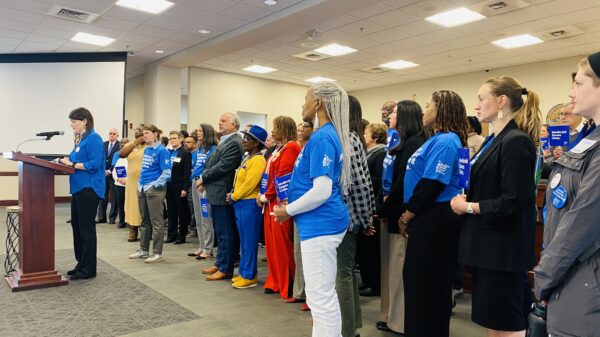By Brandon Moseley
Alabama Political Reporter
Reforming Alabama Medicaid is widely viewed as one of the most important victories of the 2013 legislative session for the people of Alabama.
Rep. Terri Collins (R) from Decatur said on Facebook that Medicaid Reform, “(moving from fee-for-service to managed care)” was among the best legislative accomplishments of the session.
Rep. Kurt Wallace (R) said on Facebook that the, “Legislation needed to fix what many view as a behemoth federal boondoggle known as Obamacare. With our reform legislation, providers will be paid based upon the results they produce, and Medicaid recipients will be discouraged from using the emergency room like it has a revolving door.”
Alabama State Health Officer and acting Medicaid Director Dr. Donald Williamson chaired the Alabama Medicaid Advisory Commission. Dr, Williamson said, “We are providing a different Medicaid program, one that’s designed locally and implemented locally by people who best understand the local healthcare needs.”
The legislation was sponsored in the House of Representatives by House Health Committee Chairman Jim McClendon (R) from Springville, who along with Senator Greg Reed (R) from Jasper, drafted the legislation. SB340 was the Senate version of the bill that the House passed, House Bill 454. ‘The Alabama Political Reporter’ talked with Rep. McClendon. Rep. McClendon said that the landmark legislation that promises to improve care for current Medicaid beneficiaries while saving the state of Alabama $tens of millions of dollars a year still has to be approved by the federal government’s Center for Medicare and Medicaid Services (CMS).
Rep. McClendon said that CMS could reject either major or minor parts of the reform package. In either case the package would come back to the legislature for them to craft a legislative response to the federal regulatory authority’s demands.
‘The Alabama Political Reporter’ asked Rep. McClendon if there was anything new in the package that CMS has not approved before for other states like Oregon whose plan is similar too in some respects. McClendon said that there are provisions in the package that do blaze new ground and that other states are looking at what Alabama did to possibly reform their own Medicaid programs. Some of those provisions have not been seen by CMS before and could potentially pose problems. McClendon said that he knew of no organized opposition to the reform legislation.
The Medicaid Reform legislation will divide the state into regions and Medicaid providers would join risk bearing Regional Care Organizations (RCOs). The RCOs would then operate Alabama Medicaid in their regions and would assume the risk for the program. In other words, the state would give the RCO a set appropriation and it would be up to the RCO to make sure that their costs do not exceed th state appropriation or they would have to cover those losses.
Chairman McClendon said that the number of regions will be determined by the Medicaid agency. “At one point we decided to have 6,7, or 8 regions. As we further looked into this we decided to let the Medicaid agency decide on the number of regions.” Rep. McClendon said that the makeup of the RCOs will be based on actuarial soundness and will depend on whether a region can support an RCO or not. Alabama Medicaid will announce those regions by October 1st of this year.
McClendon said that managed care will lead to better patient outcomes, which will lead to less emergency room visits and consequentially tremendous cost savings for the state. McClendon estimated that Medicaid reform could save the state between $50 million and $70 million a year over the next ten years.
The Alabama Political Reporter asked McClendon if the state would be able to continue to offer the same level of Medicaid benefits that it currently offers to beneficiaries if no reform plan passes without raising taxes. McClendon said “No. Absolutely not.”
Rep. McClendon said that the legislation does not address pharmacies, dentists, and nursing homes. McClendon said that those areas will be addressed in the future. Reports addressing those areas will be prepared in October 2015 for action by the legislature in the 2016 legislative session. For now those three areas will function just like they do now.
SB340 was based on recommendations by the Medicaid Advisory Commission established by Alabama Governor Robert Bentley in October and headed by Alabama Health Officer and acting Alabama Medicaid Commissioner Dr. Donald Williamson.





















































